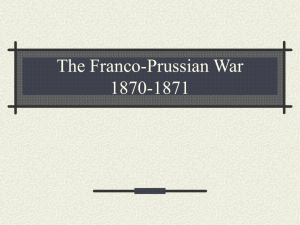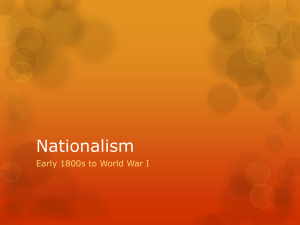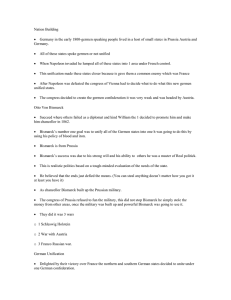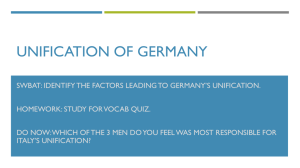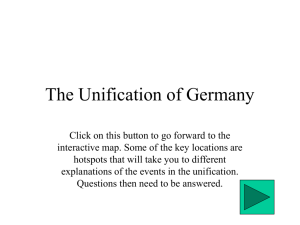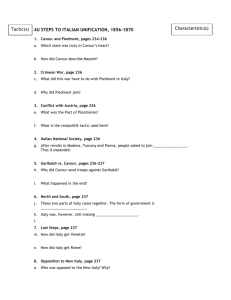www.XtremePapers.com
advertisement
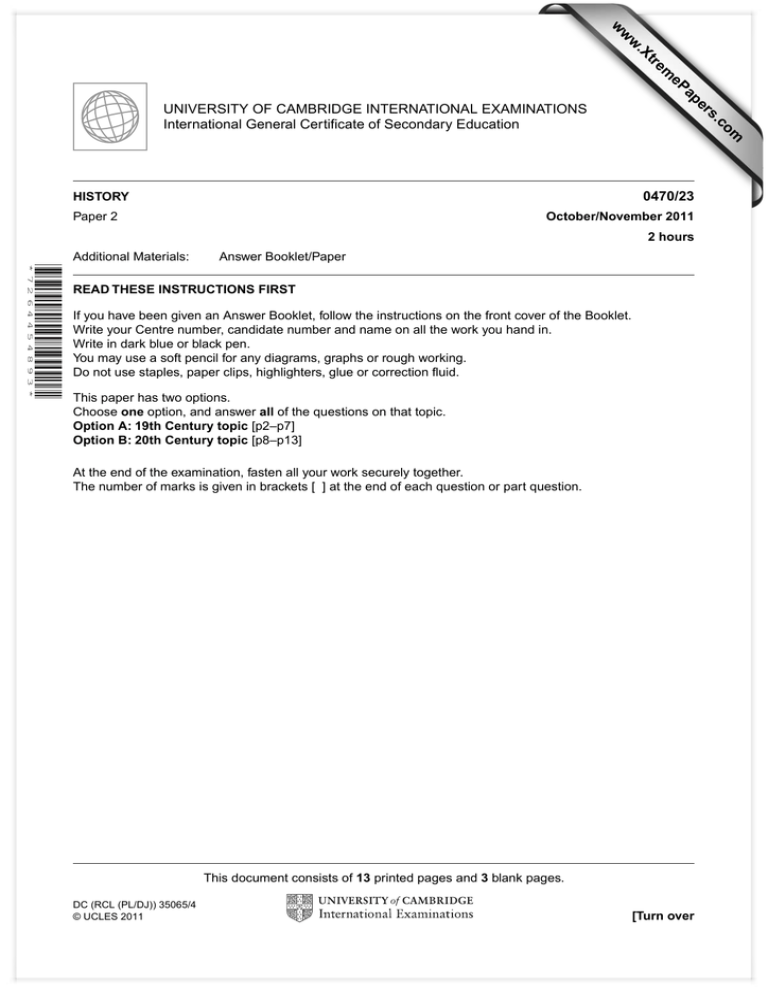
w w ap eP m e tr .X w om .c s er UNIVERSITY OF CAMBRIDGE INTERNATIONAL EXAMINATIONS International General Certificate of Secondary Education 0470/23 HISTORY Paper 2 October/November 2011 2 hours Additional Materials: Answer Booklet/Paper * 7 2 6 4 4 5 4 8 9 3 * READ THESE INSTRUCTIONS FIRST If you have been given an Answer Booklet, follow the instructions on the front cover of the Booklet. Write your Centre number, candidate number and name on all the work you hand in. Write in dark blue or black pen. You may use a soft pencil for any diagrams, graphs or rough working. Do not use staples, paper clips, highlighters, glue or correction fluid. This paper has two options. Choose one option, and answer all of the questions on that topic. Option A: 19th Century topic [p2–p7] Option B: 20th Century topic [p8–p13] At the end of the examination, fasten all your work securely together. The number of marks is given in brackets [ ] at the end of each question or part question. This document consists of 13 printed pages and 3 blank pages. DC (RCL (PL/DJ)) 35065/4 © UCLES 2011 [Turn over 2 Option A: 19th Century topic HOW FAR WAS THE UNIFICATION OF GERMANY BROUGHT ABOUT BY BISMARCK? Study the Background Information and the sources carefully, and then answer all the questions. Background Information Historians have long disagreed over what were the most important factors that led to the unification of Germany. Some have argued that impersonal factors such as the changing situation in Europe and economic developments made unification likely, and even inevitable. Others have argued that little had been achieved before Bismarck came to power in Prussia in 1862 and that unification was planned and brought about by him. Was Bismarck the crucial factor in the unification of Germany? SOURCE A Is it a mistake to begin with Bismarck? So much is written these days about the primary importance of economic and social forces in history that one runs the risk of being considered old-fashioned if one gives too much prominence to personality. Yet it is certainly unnecessary to apologise for introducing Bismarck’s name at the outset. If he had never risen to the top in Prussian politics, the unification of Germany would probably have taken place anyway, but surely not at the same time or in quite the same way as it did. The decision concerning the form unification would take was made, not in the area of economic and commercial policy, but on the battlefield of Koniggratz (Sadowa) on 3 July 1866. This victory registered the triumph of Bismarck’s policy. He had the courage to break with the traditions of Prussian diplomacy and to choose an anti-Austrian policy. He had planned the strategy that had led the Austrian Government into a position where it felt compelled to assume the responsibility for beginning the war despite the fact that its political and military resources made its chances of winning doubtful. In the weeks leading up to the outbreak of the war, Bismarck had identified the Prussian cause with that of German unity, and he made it clear that he defined this as meaning the union of all Germany except Austria. Bismarck would now have to remove the remaining obstacles to German unification, the chief of which were South German particularism and the not unnatural opposition of France. From a history book published in 1978. © UCLES 2011 0470/23/O/N/11 3 SOURCE B When Bismarck came to power he inherited a very favourable situation in a number of ways. The first was that the diplomatic situation in 1862 was exceptionally favourable for German unification. The major obstacles to German unification were the Holy Alliance between Austria and Russia and the hostility of France. Yet by 1862 these had both been removed. By the 1860s Prussia’s economic strength was formidable. In the 1850s economic development created an entirely new political and social situation: the industrial revolution was beginning in mid-Europe. Areas of heavy industrial development grew up in the Ruhr and the Saarland. Germany was on its way to becoming a modern industrial country. With the onset of industrialisation, the social landscape underwent basic changes. A prosperous and self-confident middle class developed, as did an industrial proletariat. The heartland of industrial development was Prussia which, as the strongest power in Germany in the customs union, gained increasing economic influence within Germany. In this way its political position in relation to Austria was strengthened. The rapid growth of its population, the expansion of the Zollverein, the railway network and banking facilities had brought about an industrial revolution. This economic growth had important consequences for Bismarck’s position in 1863. Prussia had already gone a long way towards gaining economic control over Germany. Prussia could rely on an excellent iron and steel industry for its weapons and on its railways for mobilising the very strong Prussian army. This meant he did not have to go to the Landtag for extra taxes. When Bismarck came to power he had an enormous advantage – he had the blood, iron, coal and gold needed to unify Germany. The economic, diplomatic and military foundations for German unity had already been laid. Far from being wasted, the years before 1862 had played an important part in the final achievement of German unification. From a history book published in 1984. SOURCE C As things are now we must face the possibility that all of South Germany will be drawn into the Austrian camp. Hatred of Prussia is growing hourly. The governments, driven by fear of Bismarck and now also by the hope of being able to defeat Prussia once and for all, are pushing forward energetically. This sorry situation is due partly to the attitudes of the Prussian liberals. I can understand that the men who for three years have fought in the front line against Bismarck’s ruinous system should have as their principal purpose the breaking of the system. However, if Prussian liberalism achieves its victory at the price of the elevation of Austria and the humiliation of Prussia, the future will pronounce a grave verdict on it. The conflict would not be removed merely by Bismarck’s dismissal. Would a Liberal government begin by giving up Schleswig-Holstein and by submitting to the Diet of the Confederation led by Austria against Prussia? If Prussian liberalism had any prospect of providing the solution to the German question, we should all support it. But all that we can see now as the probable result is a weakening of Prussia and the strengthening of Austria. A letter from Hermann Baumgarten to a fellow Prussian liberal, May 1866. Baumgarten was a leading Prussian liberal. After the Austro-Prussian War he persuaded many liberals in Prussia to support Bismarck. © UCLES 2011 0470/23/O/N/11 [Turn over 4 SOURCE D The longing for a united fatherland had a very economic background. It was the demand of the merchant and industrialist, arising out of direct business need, for the clearing away of all the historic rubbish of the petty states which stood in the way of the free development of trade. It was the desire for the removal of all the difficulties the German businessman had to overcome at home if he wanted to enter the world market. German unity had become an economic necessity. From a book by Friedrich Engels published in 1895. Engels was a communist and worked closely with Karl Marx. SOURCE E Should the Zollverein continue, the natural development of institutions by which South Germany can participate in legislating on tariff questions is unavoidable. I do not wish to underrate the importance of its being possible for a common legislative institution for tariffs (I do not wish to underrate it by simply calling it a Customs Parliament) to create an economic community for the whole of Germany. It is difficult to believe that such an institution could avoid gradually taking on most of the things that come under the headings of economic welfare and commerce, or could avoid bringing into use regulations in these affairs common to the whole of Germany. From a speech by Bismarck to the North German Confederation, March 1867. SOURCE F During the time I was in office I advised that Germany should be involved in three wars, the Danish, the Austrian, and the French; but every time I first made myself clear whether the war, if it was successful, would bring a prize of victory worth the sacrifices which every war requires and which are now so much greater than in the last century. From Bismarck’s memoirs ‘Reflections and Reminiscences’. Bismarck wrote his memoirs after his resignation as Chancellor of Germany in 1890. They were published in 1898. © UCLES 2011 0470/23/O/N/11 5 SOURCE G A cartoon from the early 1870s showing Death thanking Bismarck for the thousands killed in the course of unification. © UCLES 2011 0470/23/O/N/11 [Turn over 6 SOURCE H A statue of Bismarck from the 1870s. It shows him making preparations for the unification of Germany. © UCLES 2011 0470/23/O/N/11 7 Now answer all the following questions. You may use any of the sources to help you answer the questions, in addition to those sources which you are told to use. In answering the questions you should use your knowledge of the topic to help you interpret and evaluate the sources. 1 Study Sources A and B. How far do these two sources disagree? Explain your answer using details of the sources. 2 [7] Study Source C. Are you surprised by this source? Explain your answer using details of the source and your knowledge. [8] 3 Study Sources D and E. Would Bismarck (Source E) have agreed with Engels (Source D)? Explain your answer using details of the sources and your knowledge. [8] 4 Study Sources F and G. How far does Source F prove that the cartoonist (Source G) was right about Bismarck? Explain your answer using details of the sources and your knowledge. [8] 5 Study Source H. How useful is this source to a historian studying German unification? Explain your answer using details of the source and your knowledge. [7] 6 Study all the sources. How far do these sources provide convincing evidence that Bismarck was the most important factor in German unification? Use the sources to explain your answer. [12] © UCLES 2011 0470/23/O/N/11 [Turn over 8 Option B: 20th Century topic WAS GERMANY PUNISHED TOO HARSHLY IN THE TREATY OF VERSAILLES? Study the Background Information and the sources carefully, and then answer all the questions. Background Information The Paris Peace Conference took place in 1919–20. The resulting Treaty of Versailles punished Germany in a number of ways, including making Germany pay reparations to the Allies. Although a German delegation was present at Paris, it was not allowed to take part in the negotiations. The terms of the Treaty were really decided by Britain, France and the USA, and Germany was forced to accept them. There were claims at the time that the Treaty was far too harsh on Germany and would cause problems in the future. However, others have argued that Germany should have been punished more harshly, and that the effects on Germany have been exaggerated. Was Germany punished too harshly? SOURCE A The United States expected the Europeans to pay back the money they had borrowed during the war. For the Europeans, reparations promised a way to pay off their debts. France had suffered the most direct damage, but Britain had spent the most. There were intense debates over the question of how much Germany could pay. If the figure were set too high, the German economy might collapse, which would not help British exporters. If too low, Germany would be getting away lightly. Because the peacemakers could not agree on a final figure, a special commission would be set up to determine what Germany should pay. This understandably brought charges from the Germans that they were being asked to sign a blank cheque. Although historians are increasingly coming to the conclusion that the burden was never as great as Germany claimed, reparations remain the main symbol of the peace. The standard view is that the reparations stand as evidence of a vindictive, short-sighted and poisonous document. Responsibility for the disastrous consequences, so the argument goes, starts with the peacemakers of 1919. However, Hitler did not wage war because of the Treaty of Versailles. Even if Germany had been left with its old borders, and its military forces, he still would have wanted more. When war came in 1939, it was a result of twenty years of decisions taken or not taken, not of the arrangements made in 1919. The peacemakers tried to build a better world but they struggled with huge and difficult questions. From a history book published in 2001. © UCLES 2011 0470/23/O/N/11 9 SOURCE B The future life of Europe was not the concern of the Allies in the negotiations. Their concerns related to the future weakening of a strong and dangerous Germany, to revenge, and to the shifting by the victors of their unbearable financial burdens onto the shoulders of the defeated. The policy of reducing Germany to servitude for a generation, of degrading the lives of millions of human beings, and of depriving a whole nation of happiness, should be abhorrent and detestable. Nations have no right to use peace treaties to punish the children of their enemies. The Treaty includes no provisions for the economic recovery of Europe. The Council of Four paid no attention to these issues, being preoccupied with others – Clemenceau to crush the economic life of his enemy. From ‘The Economic Consequences of the Peace’ by J M Keynes, published in 1919. Keynes resigned from the British delegation at Paris. The book was a best-seller in Britain and Germany. SOURCE C A German cartoon published in 1919. The mother is saying to the child, ‘When we have paid one hundred billion marks then I can give you something to eat.’ © UCLES 2011 0470/23/O/N/11 [Turn over 10 SOURCE D A British cartoon published in 1919. © UCLES 2011 0470/23/O/N/11 11 SOURCE E I have the honour to present to your Excellency the report on the effect of the Peace Terms on the situation of the German population. When the territorial clauses of the Peace Treaty go into effect Germany will lose in the East the most important regions for the production of wheat and potatoes. The Peace Treaty provides for the loss of almost a third of the production of our coal fields; in addition to that loss, enormous deliveries of coal to various Allied countries are imposed on us for ten years. After the economic repression caused by the loss of her Merchant Fleet and her foreign possessions, Germany will no longer be in a position to import raw materials in sufficient quantities from abroad. As a matter of course an enormous part of German industry would thus be condemned to extinction. After a very short time Germany would therefore no longer be in a position to provide bread and work to its many millions of persons forced to earn their daily bread by trade and commerce. The Peace would impose upon Germany many times the number of human lives cost it by this war of four years and a half. Those who sign this treaty, will sign the death sentence of many millions of German men, women and children. I believe that my duty, before beginning the discussion of other details of the treaty, is to bring to the attention of the Allied Delegations this summary of the problems facing the German people. From a report submitted to Clemenceau on 13 May 1919 by the German Delegation during the negotiations at Versailles. SOURCE F The greatest fraud in the history of the world is now being carried out in Germany, with the full support of its population. This fraud is being carried out under the very noses of the Allies. Germany is full of wealth. It is humming like a beehive. The comfort and prosperity of its people amazed me when I was there. Poverty is almost non-existent. Yet this is the country that is determined it will not pay its debts. It is a nation of actors. If it was not for the fact that the German has no humour, one might imagine the whole nation was carrying out a great practical joke! From a letter published in a British newspaper from a businessman who had just returned from Germany, April 1922. SOURCE G The terms are in many respects terrible terms to impose upon a country. Terrible were the deeds which it has to pay for. Germany not merely provoked, but planned the most devastating war the earth has ever seen. It deliberately embarked upon it, not to defend itself against assailants, but to expand itself at the expense of its neighbours. I cannot think of a worse crime. The aim of the Treaty is to compel Germany, in so far as it is in its power, to restore, to repair and to redress. Yes, and to take every possible precaution of every kind that is in our power against the repetition of another such crime – to make such an example as will discourage ambitious peoples from ever attempting to repeat the infamy. Lloyd George, speaking in Parliament, July 1919. © UCLES 2011 0470/23/O/N/11 [Turn over 12 SOURCE H A cartoon published in a British newspaper, 1921. The figures on the right are the Prime Minister of France, Briand, and Lloyd George. Lloyd George is saying to Briand, ‘Perhaps it would pull better if we let it touch earth.’ © UCLES 2011 0470/23/O/N/11 13 Now answer all the following questions. You may use any of the sources to help you answer the questions, in addition to those sources which you are told to use. In answering the questions you should use your knowledge of the topic to help you interpret and evaluate the sources. 1 Study Sources A and B. How far do these two sources agree? Explain your answer using details of the sources. 2 [7] Study Sources C and D. Would the cartoonist of Source C have agreed with Source D? Explain your answer using details of the sources and your knowledge. [8] 3 Study Sources E and F. How far does Source F make Source E surprising? Explain your answer using details of the sources and your knowledge. [8] 4 Study Source G. How far do you trust Lloyd George in this source? Explain your answer using details of the source and your knowledge. [7] 5 Study Source H. Why was this cartoon published in 1921? Explain your answer using details of the source and your knowledge. [8] 6 Study all the sources. How far do these sources provide convincing evidence that Germany was punished too harshly in the Treaty of Versailles? Use the sources to explain your answer. [12] © UCLES 2011 0470/23/O/N/11 14 BLANK PAGE © UCLES 2011 0470/23/O/N/11 15 BLANK PAGE © UCLES 2011 0470/23/O/N/11 16 BLANK PAGE Copyright Acknowledgements: 19th Century Option Source A 19th Century Option Source B 19th Century Option Source H 20th Century Option Source A 20th Century Option Source B 20th Century Option Source C 20th Century Option Source D 20th Century Option Source H © Gordon A Craig; Germany 1866-1945; Oxford University Press; 1978. © Fragen an die Deutsche Geschichte; German Bundestag Press; 1984. © ed. Roger Morgan; Germany 1870-1970; 1970. © Margaret Macmillan; Peacemakers; John Murray; 2001. © J M Keynes; The Economic Consequences of the Peace; Macmillan; 1919. © Roy Douglas; The Cartoonists’ Vision 1919-1939; Routledge; 1992. © Ben Walsh; Modern World History; John Murray; 1996. © British Cartoon Archive Ref. No. LSE6501. Permission to reproduce items where third-party owned material protected by copyright is included has been sought and cleared where possible. Every reasonable effort has been made by the publisher (UCLES) to trace copyright holders, but if any items requiring clearance have unwittingly been included, the publisher will be pleased to make amends at the earliest possible opportunity. University of Cambridge International Examinations is part of the Cambridge Assessment Group. Cambridge Assessment is the brand name of University of Cambridge Local Examinations Syndicate (UCLES), which is itself a department of the University of Cambridge. © UCLES 2011 0470/23/O/N/11
